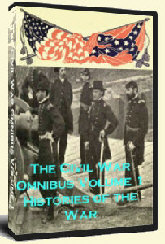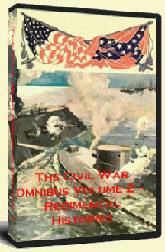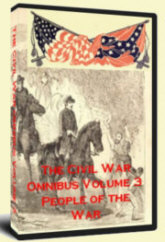Feeling that the war was nearing its end, I desired my cavalry to be in at the death.Sheridan on his desire to rejoin the Army of the Potomac
With both Jubal Early and most of the civilians in the Shenandoah Valley still choking on the smoke of “The Burning,” General Philip Henry Sheridan, sensing that the tide of the war was turning toward the destruction of Robert E. Lee and the Army of Northern Virginia, took his men to Petersburg, rejoining the Army of the Potomac. Once again the Army of the Potomac would bask in the glory of “Little Phil,” as it was during this stint with the Army of the Potomac that Sheridan’s reputation as a hero was secured, as he managed to bring down not only Jubal Early’s men, but Lee and the Army of Northern Virginia, as well.
Sheridan wasted no time resting on his Winchester laurels as he ventured to Petersburg. At the Battle of Waynesboro, he forced 1,500 of Early’s men to surrender. Less than month later, he forced Lee to flee Petersburg. Only days later, at the Battle of Sayler’s Creek, Sheridan dealt Lee a final, crushing blow by capturing almost a quarter of his remaining men. Read the rest of this entry »
Comments Off on “Worth His Weight in Gold:” Philip Henry Sheridan – pt. 2
A brown, chunky little chap, with a long body, short legs, not enough neck to hang him, and such long arms that if his ankles itch he can scratch them without stooping.Abraham Lincoln, describing Philip Henry Sheridan
Philip Henry Sheridan, or “Little Phil” as the 5 feet 5 inch tall officer came to be known, came out of relative obscurity toward the end of the Civil War to become one of the heroes of the Union effort. Succeeding where many older and more distinguished men had failed, Sheridan was able to assist in rousing the long-suffering Army of the Potomac into action and help General Ulysses S. Grant to defeat General Robert E. Lee and the Confederate Army of Northern Virginia.
Born in New York to Irish immigrant parents, Philip Henry Sheridan grew up in Ohio. In 1848, he began his military career at West Point. His years at West Point were not without controversy; during his third year, Sheridan was suspended for fighting with a classmate whom he’d previously threatened to bayonet. This scuffle, the result of some real or perceived insult to Sheridan, resulted in delaying his graduation by a year. He left West Point in 1853, graduating 34th of 52 cadets. Read the rest of this entry »
Comments Off on “Worth His Weight in Gold:” Philip Henry Sheridan – pt. 1
The divisions in American that resulted in the Civil War were hardly drawn at the Mason-Dixon line. While divisive opinions about slavery abounded throughout the United States, and to an extent the Confederacy, the issue of secession caused more disagreement throughout the South than slavery did. For these “Unionists,” as they became known, whether or not slavery was constitutionally mandated was beside the point – once a part of the United States, there was no turning back, no secession.
Although support for a nascent Confederacy was strong in many of the Southern states during the Secession Crisis of 1860-1861, this support was hardly unanimous. A significant number of Southerners felt that secession was either illegal or unnecessary, of this number, there were those who felt that secession would never truly come to fruition. Others still, those who did not own slaves or perhaps did not support the institution of slavery, were opposed to secession from the Union on the grounds that the inevitable outcome would be a “rich man’s war and a poor man’s fight.” Read the rest of this entry »
Comments Off on The “Lost” State of Nickajack
Regardless of one’s personal feelings about the factors that created the Confederacy, it is difficult to deny the accomplishments of the military officers of the Confederacy. No one would argue that Robert E. Lee and Stonewall Jackson were not impressive military generals, or that J.E.B. Stuart or P.G.T. Beauregard was not as fine in battle as anyone the U.S. Army had to offer. What, then, accounts for the tarnished reputation of Braxton Bragg, the eighth-highest ranking officer in the Confederate Army who is nonetheless remembered as the Confederate Army’s biggest liability?
Read the rest of this entry »
Comments Off on Braxton Bragg
If there is any place on God’s fair earth where wickedness ‘stalketh abroad in daylight’ it is in the army.” a Confederate soldier, in a letter to his family
General William Tecumseh Sherman’s declaration that “war is all hell” was never more true than when applied to the Civil War. A long, bloody, and tiresome war for those who were pressed into service, the Civil War proved to be so stressful to many that they sought comfort from a bottle. Whether a bottle of whisky or a bottle of opium, drug and alcohol abuse was a fact of life for many during the Civil War era, and that number included several of the most renowned heroes of the war. An often overlooked fact of the war, alcohol and drug use were nevertheless an influential, if sometimes disregarded, factor in the war. Read the rest of this entry »
Comments Off on Demon Rum – Alcohol, Drugs, and the Civil War


